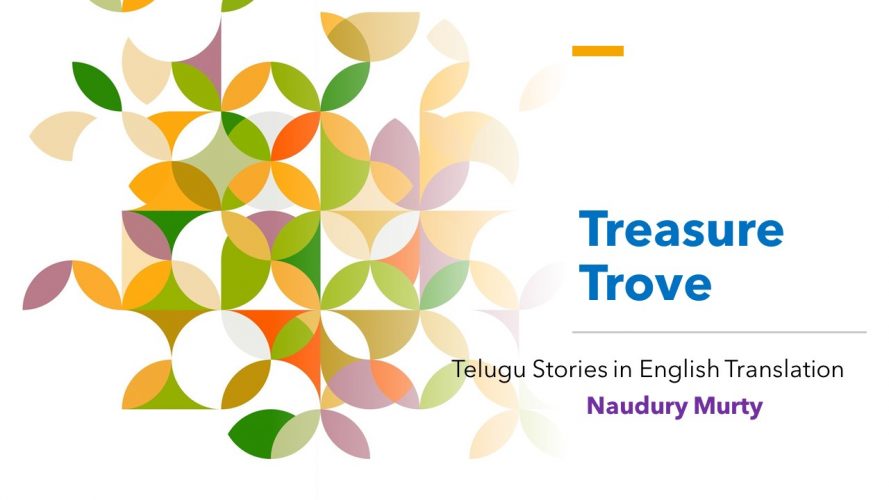Telugu: K. Sabha (1.7.1923- 4.11.1980)
[Between a children’s short story requiring ‘suspension of disbelief’, and a biographical narrative that would normally deal with only incidents that had happened in real life, the incidents of a good short story should lie in the realm of probability to possibility, leaning more towards the latter. In this narrow interval lies the skill and expertise of a good short story writer.
While he was better known as a children’s short story writer, K. Sabha deals with the, then, most common subject in a gripping manner. ]
*
“What a pity! I did not realize till now that you are my only friend, true and dear, that I can bank upon in this whole world,” spoke the skull, pulling out its tongue through the flaming lips over the funeral pyre.
Giji, the pariah, was petrified.
“Yes! So true!” endorsed an owl through the dense foliage of the rose apple tree standing on the northern end of the cremation ground.
“Ahoy, all civilized men! Pay attention!” howled a fox at the height of its voice.
“Why do you still stand there? Hope you had an easy job today. The wood used for the cremation was all sandal. They just poured out about five to six cans of cow ghee. To add to that, my body was full of fat. It must have oozed quite an amount of oil. Watch how the muscles of my right hand are disintegrating. In another fifteen everything will turn to ashes,” the skull had said through the rousing tongues of fire, as if it were yawning in its sleep.
The two legs of Giji started to shiver with fear. He took support of the bamboo-stick he was using to manage the pyre to steady himself.
“Don’t get so scared. I had been talking till this early morning. I died only later. Strictly speaking, I have not yet died fully; some of the cells of my body are still alive. They have just been getting extinguished as I was speaking to you. In this lonely, desolate place, you are the only soul that has been keeping company with me until the last spec of my body disappears from this world. All other people have left. My three sons have left. Daughters have more love for their father than sons, they say. But they have remained at the threshold of the house itself. So did my wife. Why? Even my shadow is not seen around. I don’t know where it has gone. It might have dissolved in the raging tongues of fire. What a wonder!” spoke the skull softly, leaping up a yard above from the funeral bed.
“What a pity!” cawed the king-crow from the wild date palm on the right.
Giji suddenly pulled and warped his right leg. He could not stand anymore and slowly limped up to the nearest stone mound and from there watched the fire, leaping up.
He was in the most enigmatic situation of his life.
Where was he? Was it a dream? Or, real?
‘No. No. It is not a dream. You are right at the center of the village burial ground. You are cremating the body of the Zamindar,’ reminded his surroundings.
Giji thought for a moment.
In the fifty-eight years of his life, he might have cremated about fifteen hundred corpses. Hundreds of skulls might have made violent, blasting sounds while separating from their torsos, but he ignored them like the sounds of crackers on a festive day. There were number of occasions when the bodies stood up from the pyre, but he beat them down with his pole till they got desiccated completely. He was never afraid. But this night, he was in for a big surprise: the skull started talking to him!
Could it be that Zamindar was trying to take revenge even after he passed away?!
*
Giji got up. A streak of lightning struck the orient sky. The bats, hanging upside down in the hollow of the banyan, fluttered their wings. Somewhere in the thicket beyond the yonder promontory, the roaring of a cheetah was heard.
“Let me admit,” continued the skull, “these are the very hands that beat you ‘that’ day. But look here! Watch how these fingers are getting scorched. The wrist looks more like a chain of beads. Gijiga! That day you wailed your heart out. Didn’t you? I bound you to the wooden post meant for bovine on the village outskirts and kicked you. Watch the same right foot now. It is burning out painfully. Every nerve and bone are breaking to pieces. Giji! Does it surprise how I am able to talk to you? So is the case with me. You are shivering with fear as a skull seems really talking to you. Let me assure you: I am neither a ghost nor a fiend. You don’t have to be frightened. I should have tendered my apologies when I was alive. But somehow, that did not happen. I should have long realized that you are my true well-wisher, adviser, relative, kin, and a friend, a bosom friend at that. I realized it too late now. I cry with remorse. You can’t perceive the intensity of my grief. The tears I shed could swell over a thousand ponds. But you can’t see a single drop of it. They have all evaporated. For that matter, even the eyes themselves have been lost. Notice carefully. You find just two deep, empty sockets now where there were eyes before. Giji! Do you believe me? I am speaking the truth. My heart burns with repentance. Do you need some proof of that? Then look here- see how this heart is scorched here. You set the chest plate properly on the pyre. The ribs have already gotten incinerated. Do you see my lungs? O…o…o…o…oh! The heart is decimated in a wink. I like it turn to ashes this way. It is befitting. Because I heartlessly subjected people like you to unmentionable tortures. Even if I had had a heart, it might have been inert and harder than steel. But it melted like butter today. Of what use was its existence? It is charred beyond recognition. Can you forgive me? What do you say, Giji?”
Two foxes walked near the funeral pyre and loitered around aimlessly. Giji leaned forward, watched them keenly, only to get confirmed that they were really foxes. Overwhelmed with disbelief, he nervously felt for his pulse. He tried to get up but overcome with weakness he sank back.
“You were not at fault ‘that’ day. No sensible person can call it that way. I put you to undeserving suffering. Please forget! Won’t you?”
Giji did not see the burning skull this time. Instead, he saw the teary face of his Zamindar grieving with remorse. His hazy gray moustache glistened like a lace of silver bristles. And the silk turban over his crown was brilliant.
“Did you recall now ‘that’ day when I bound you to the wooden post on the village outskirts?” Zamindar’s voice failed choking up with emotion. The golden rings on his fingers were visible clearly- particularly the diamond one on the left little finger. And on that diamond, he saw a circle. At the center of the circle, he saw a strange spectacle. He saw himself therein.
“That day… do you recall now?” the voice was faintly audible now.
“Yes, my lord! Yes…” Giji responded even more faintly, with his voice not escaping his gullet.
Giji always answered the Zamindar as “Yes, my lord!” and his son as ‘Yes, master!’ and rest of the farmers as ‘Yes, father!’
‘That day!’ reiterated the voice…
*
Yes.
That fateful day, Giji started off to go to his father-in-law’s place!
He intended to go to father-in-law’s place. And he reached his father-in-law’s place. But the two sentences did not connote the same thing.
For, in the village folk parlance, ‘going to father-in-law’s place’ also connotes going to jail. Newly married, Giji fancied going to his in-laws’ place. His brother-in-law came to invite him. Giji donned a gold-laced dhoti, a matching turban and put on a coat. Giji being the head of the Harijan colony, many farmers of the village presented him with clothes befitting their rank and standing. He opened an umbrella over his head. He put on thick-heeled creaking shoes. They were dusted with mica for a fancy look. Absentmindedly, he started walking along the street when he suddenly encountered the Zamindar from the opposite direction! That’s it! The Zamindar surveyed Giji from top to bottom once! Giji literally stood shivering in his shoes. Then he suddenly recalled his mistake:
He broke the age-old custom; a practice followed for centuries. He offended the very social order!
Poor chap, to his credit, he instantly made amends. He bowed down, removed his shoes, and holding them in his hands stood humbly before the Zamindar.
“Who is there? Basha!” the Zamindar roared. Basha was standing next to him behind. He came forward, waiting for his orders.
“Take him to the Bovine post,” ordered the Zamindar.
The street reverberated with his order.
Basha exercised his strength of muscles for fifteen minutes.
And the Zamindar kicked Giji until his legs ached.
“Dirty fellow! How dared he to walk in front of Zamindar’s house with shoes on? Has he any sense of his low rank? A pariah!” the priest commented, baring his teeth in contempt.
“There must be a limit to anything. What arrogance! How dare he, a Mala[1], to walk the main road in broad daylight with shoes?” murmured Buchchamma, a rich, high-caste lady.
“Out of consideration for a fellow villager, everybody extended a helping hand for the marriage. Did you notice the consequence? That is why our elders said – ‘beat a Madiga[2] giving him a chance to speak, but a Mala, without giving him one,’” said Veerayya, stuffing a trifle of tobacco-straw between his jaw and cheek.
Giji’s skin was bruised, pared, sliced, and scratched everywhere. Blood coagulated within, under the pressure of severe blows. And the blood that had spilt out, flowed into a pool.
“This useless fellow must certainly visit the father-in-law’s place,” announced the Zamindar before leaving.
The same evening, he put behind the bars.
Giji was quickly charged with stealing the golden braces belonging to the ‘competition-cock’ from Basha Saheb’s house and the charge was proved within minutes, and he was sent to jail. He served a five-week RI and came out with his name on the list of convicts.
From that day onwards, he never put shoes on, or opened an umbrella when it rained. He found no meaning for the umbrella when there were no shoes.
*
“Giji! What a horrible blunder I did! With these very hands, I donated a pair of new shoes to the Purohit during obsequies of my father! Presented him with an umbrella laced with silken threads. But, with the same hands, I failed to present anything to you, who always protected the village as its well-wisher and servant. Instead, I punished you hard for wearing the shoes, who earned his living of your own sweat. I am a great sinner! It was you who communicated to my relatives about my demise! It was you who guarded me unto my last like the pair of eyelids. What an afront I committed towards you! Won’t you forgive me? I hold your hands, Giji!”
Zamindar’s skull shed tears profusely. Giji looked all around in disbelief. Making a scratchy call, a Francoline Partridge flew past like an arrow. The foxes left the place capering. The brilliance of the circle on the diamond ring had diminished gradually. And now, the lone diamond on the ring was visible, twinkling like a star. Suddenly, darkness seized from all ends. What happened to the raging flames? Giji, sitting on the stone seat, wanted to get up.
*
He heard a banging sound on the door.
“Giji! You lazy Buffalo!”
No mistake. It was Zamindar’s voice.
He got up hurriedly, rubbing his eyes.
In the process, he banged his head against something.
“Oh! You broke the pot in the sling. And scattered last night’s food all over!” Chandri cursed Giji in her anger, getting up from bed.
“Hey you! It is already hours into the day! Did I not ask you to ready the bullocks for getting mango saplings from Santa Peta? You are sleeping still when the sun is already up? Want me to break your sides? Open the door! You, ass!”
Zamindar was spitting fire.
Shivering with fear, Giji opened the door.
With a hand-length cigar in his mouth, a bushy silken moustache, and ruddy eyes, Zamindar’s face looked more frightening.
With a throbbing heart and quivery looks Giji murmured,
“Are you still alive, my lord!”
The words were not audible to himself.
To be heard, they should have been delivered by his lips in the first place.
They were just shot out of his eyes!
*
(Original: Kamandulavari Kapaalam – K. Sabha)
[1] Mala )( are two lowest castes in Hinduism.
[2] Madiga )(









Add comment